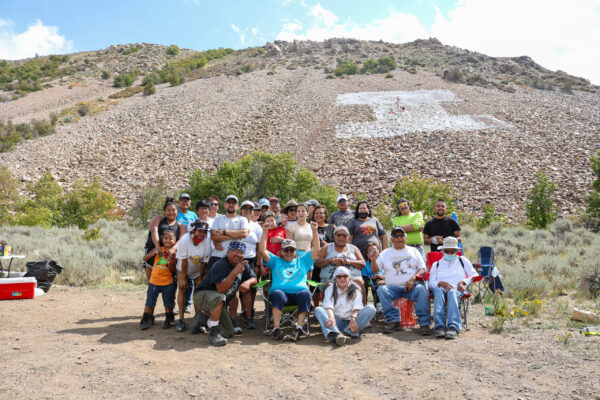My grandfather was a teacher at Intermountain Indian School in Brigham City and often talked about his time teaching as well as a trainer for the Bureau of Indian Affairs, so when I noticed a KSL TV article that mentioned alumni from the school gathering to repaint the “I” in Brigham City, I was interested.
The school opened in 1950 and closed in 1984.
The article describes the experience of 26 of the grads spanning though various classes and their fond memories. For some, they met important people in their lives such as a best friend or a spouse. Others described extra-curricular activities they would not have had at public schools. One attendee credited the school for giving her opportunities not available in her home with an alcoholic father.
The article was more in line with the narrative I’d heard from my grandpa about Indian boarding schools, and contrasts what has come to light in the last few years about the boarding schools established at the turn of the century. Whenever Grandpa spoke of the Native Americans it was always with admiration and respect. He was proud of his students, proud of his many interactions with a number of tribes, and completely enamored with their culture.
After his teaching career, he worked to train tribes to take over the programs that were then administered by the Bureau of Indian Affairs — one tribe was so grateful for his love and dedication to getting them ready to take on this work that they made him an honorary member of their tribe.
Over the last few years, learning about some of the early boarding school practices of manual labor, abuse, and cultural erasure certainly sent a shock through the country. We’ve come a long way in the last 120 years in terms of technology, quality of life, and value for others’ differences.
A few days after the KSL TV article was published, a statement from the Paiute Indian Tribe of Utah confirmed that 12 unmarked graves had been found at the site of the Panguitch Indian Boarding School using “ground penetrating radar and magnetic gradiometry.” That school ran from 1904-1909.
Reading both articles made me think about why I was so comforted to read that first KSL TV article. For the two years since the story broke about the suspected 12 buried students and the conditions of the Panguitch school so close to home, I worried that maybe my grandpa was part of that — just at a different school. Additionally, being from Southern Utah, I probably have an ancestor that could have been directly related to the running of the Panguitch school. What did that mean about me?
Perhaps history is not meant to define who we are today. It does mark our progression, though, and can help us know how to proceed in the future. The Panguitch school was shut down because it was not good for students. Later, Intermountain School was built in response to a call for assistance from the Ute Tribe. Now the Paiute and other affected tribes have a piece of their history and knowing can help heal.
The sharp contrast between the Intermountain story and the many other tragic stories told in recent years should serve as a reminder to us. Those who use the past to divide and distract us from today’s devastating problems will further hinder the growth of humans as a family.
We can acknowledge wrongs from history, analyze the circumstances that surrounded those events, and, if appropriate, work to correct the shadows left behind. However, we have too much work now to solve today’s problems that we simply cannot take on the guilt of past problems.
– by Naketa S.
Feature image caption: Alumni of the Intermountain Indian School in Brigham City gather to repaint the “I” on the hill. Courtesy Ivana Martinez/KUER.

